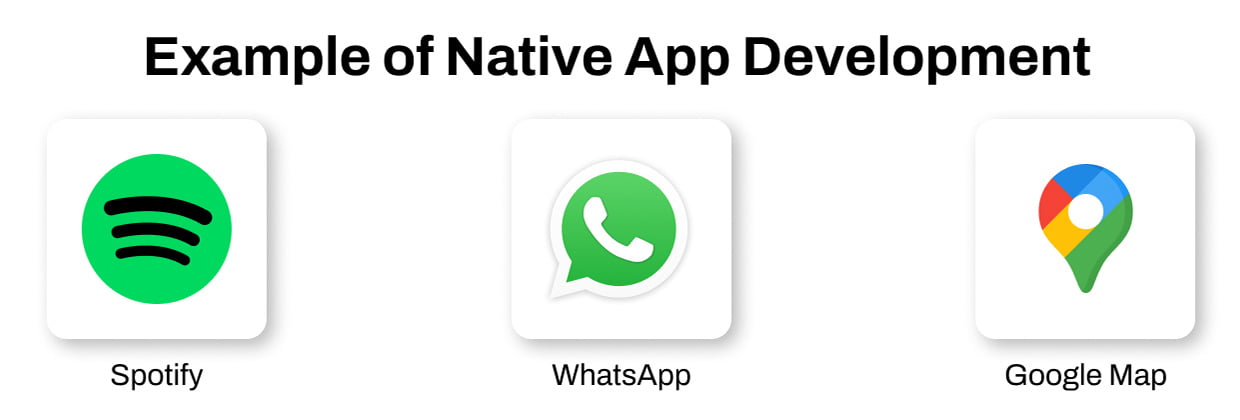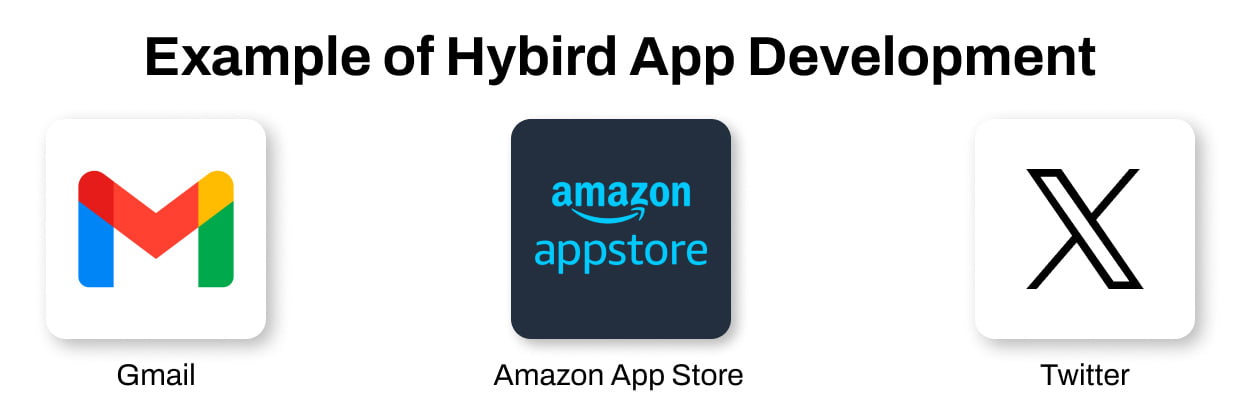Last Updated on April 26, 2025 by APEX Team
One thing that stands out about endlessly changing horizons is that no young and ambitious mind can fully realize the strength of innovation. Furthermore, around the past decade, mobile apps have been a phenomenon globally, including all users.
In just a matter of decades, we have witnessed the speedy transformation of our digital environment and the emergence of opportunities for business players to improve their strategies and skills. Through innovative mobile applications, a brand can gain a competitive advantage and, therefore, place itself in a leading position.
Creating a distinctive app calls for clear thinking, and among the classic checkpoints to consider is the choice of the native or hybrid approach. Hence, the debate of native vs hybrid mobile app development has been going on for a while, and honestly, there is no black-and-white answer to it.
Understanding Native Mobile App Development
Native mobile app development involves creating apps designed to work on specific devices and mobile platforms like Android and iOS. These apps are carefully constructed to match the needs of a particular system using unique programming languages. This entails formulating easily navigable applications coupled with interactive designs and functionalities.
The native approach, on the other hand, allows developers to fully utilize the platform. Eventually, developers develop an application with a native interface, making it user-friendly. They can also take advantage of the native features of modern digital devices and add some advanced features to their app. The native app development tools organizations adopt include Android Studio, Xcode, Visual Studio, Java, C#, Objective-C, Swift, and Kotlin.
Examples of Native App Development
Some examples of native apps that we use often include:
- Spotify: Spotify’s native app is its greatest strength because it allows a precise run of iOS and Android platforms. This allows Spotify to offer excellent sound quality and a user-friendly interface, too.
- WhatsApp: Working equally with other messaging apps, WhatsApp is all about the untouchable smoothness and effortless syncing.
- Google Maps: Google Maps is not an independent but a native mobile app with a strong and reliable mapping tool.
Pros of Native App Development
Mobile applications battle their way to the front line in the fast-paced digital economy. Realizing that the app development process can critically impact the end-user experience of your app is paramount. Why not let us take a closer look at the various benefits of native application development for iOS and android platforms as we decide to pick between Native vs Hybrid Mobile App Development?
Swift Speed
Native mobile apps have high-speed performance and can be lean with their streamlined code. Unlike hybrid and cross-platform apps, Native mobile apps are preceded with most elements and displayed immediately without delay. So, this high speed of development comes out at a low cost, which makes native applications the most preferred option of startups.
Seamless Offline Functionality
Furthermore, one of the main advantages of native apps in Native vs Hybrid Mobile App Development debate is that they can be used without any internet connection. App users can benefit from all features even when airplane mode is turned on. This support is invaluable to people in areas with limited internet, remote locations, or tight data coverage.
Intuitive Interactivity
Native apps provide a high-end user experience and follow the rules of an operating system only. This inevitability lifts the communication into a smooth and natural interaction that aligns perfectly with it.
Cons of Native App Development
Here are the multiple cons of hybrid app development:
Limited Code Reusability
Native iOS and Android app development requires unique approaches, which cost time, resources, and money. Therefore, this differs from the reusable code if the hybrid or cross-platform app development approach is used.
High Maintenance
Regarding Native vs Hybrid Mobile App Development, Hybrid app development usually demands maintenance expenses, which are likely to be higher than the original investment in development.
Intense Talent Demand
Programming native mobile apps requires developers proficient in each platform’s language. Today, finding such a talented individual is becoming quite difficult. Conversely, the cross-platform team is typically easy to create and form.
In this debate about Native vs Hybrid Mobile App Development, one of the major advantages of hybrid app development is the speed and cost of app development. So, let us look at multiple benefits, disadvantages, and examples of hybrid app development to understand the approach clearly.
Understanding Hybrid App Development
Hybrid app development can merge both native and web solution code with the use of plugins such as Icon’s Capacitor or Apache Cordova. This integration allows native utilities to become reachable.
The hybrid platform integrates the backend code with the downloadable native widget to present application functions and back-end operations. It only has a single codebase for multiple platforms that improve efficiency.
Hybrid apps have performance and user experience functions that are almost the same as native apps. Consequently, improvements in the user experience and navigation design are still necessary.
Examples of Hybrid App Development
Amazon App Store: The Amazon App Store has a hybrid structure that makes it very easy for experienced users to switch between different apps and take advantage of the best parts of both native apps and web applications at the same time.
- Twitter: It uses web components and native integration to apply the hybrid app approach. Therefore, this approach makes content simple to browse through and allows for functions like push notifications, geolocation services, and media insertion.
- Gmail: Gmail combines hybrid app development, where web-based parts are provided for email management and text writing. Features such as standalone access, push notifications, and full integration with the iPhone Address Book and Calendar make it remain native in essence.
Pros of Hybrid App Development
When it comes to Native vs Hybrid Mobile App Development, due to the unique features, hybrid app development is among the most general options for modern businesses.
Simplified Maintenance
Web-based hybrid apps make it easy to upgrade management systems. Nevertheless, this cannot exist simply because coding for native and cross-platform apps is highly complex.
Cost Efficiency and the Reduction of Red Tape
Hybrid app development is a cost-saving, especially suitable for startups wanting to control costs. Hybrid structures promote functional single-format development on any platform and address the issue of creating different versions for multiple platforms.
Enhanced UI/UX
Hybrid apps combine native and web characteristics to provide an optimum user experience on Android and iOS devices. The UI for hybrid apps incorporates real-time content loading, making the interaction smooth and user-friendly.
Cons of Hybrid App Development
Talking about Native vs Hybrid Mobile App Development, the cons of Hybrid App Development include:
No Offline Functionality
Unlike native apps, hybrid apps have difficulty supporting an offline mode. Users rely on an Internet connection to access the app’s functions.
Operating System Variations
This poses such a challenge as the single code deployment of hybrid apps could cause inconsistencies across different operating systems. Certain parts implemented for an individual OS could not transfer smoothly to the rest, causing issues. For example, Android-specific stuff gives problems on iOS devices.
Native App vs Hybrid App Features Comparison
| Features | Native App | Hybrid App |
| Language | Java for Android, Swift for iOS | CSS, HTML, and JavaScript |
| Performance | Faster and reliable | Slower as compared to the native apps |
| Development Cost | High | Moderate |
| Time to Market | Slow | Fast |
| Speed | Fast | Slower as compared to the native apps |
| User Experience | Rich and intuitive | Never a fully-native experience |
| Security | Highly Secure | Moderately Secure |
| Complexity | Complex Coding Structure | Write Once, Run Anywhere Code |
| Device Feature Integration | Seamless | Inadequate |
| Access to Native APIs | High | Moderate |
| Frameworks | API provided by the operating systems | Xamarin, React Native, PhoneGap |
Conclusion
Native apps, with their superior technical capabilities and advanced features, will most often ensure the best possible experience, consistent with the demands of specific platforms. On the other hand, hybrid apps allow organizations to have a cost-effective and fast-developing process that is best suited for fast market entry without sacrificing the quality of their products.
Therefore, when choosing between Native vs Hybrid Mobile App Development, you should rely on your organization’s very important peculiarities and the preferences of your end-users. It is advisable to engage the expertise of mobile app development specialists to get the right pick for your project.
Frequently Asked Questions
Native vs Hybrid Apps – Which approach is better for mobile app development?
Choosing between native and hybrid app development depends on what you need. Native apps work super fast because they’re built specifically for one platform like Android or iOS. Hybrid apps are great because they work on lots of different devices and systems without needing to be remade for each one. So, it’s important to pick the right one based on what you want your app to do and how quickly you need it done.
Why is native app development often more costly than cross-platform or hybrid app development?
Native apps cost more because they need different code for each platform, like Java for Android and Swift for iOS. Hybrid apps use one code for all platforms, so they’re cheaper and quicker to make.
Native apps cost like android app development cost and iOS app development cost more because they need different code for each platform, like Java for Android and Swift for iOS. Hybrid apps use one code for all platforms, so they’re cheaper and quicker to make.
What are some hybrid app development tools used by APEX Web Studios?
- Ionic
- React Native
- Flutter
- PhoneGap
- Xamarin
- Appcelerator
- Titanium
- Onsen UI
How much does native app development cost?
Making a native app can cost between $50,000 to $200,000, depending on factors like how complex it is, how quickly you need it, where the developers are, and what features you want. Contact our experts for a clear cost estimate based on your needs.
Looking To Dive Into The $568 Billion Mobile App Market With A Hybrid Or A Native App?
We can help you choose the best development platform as per your business requirements








